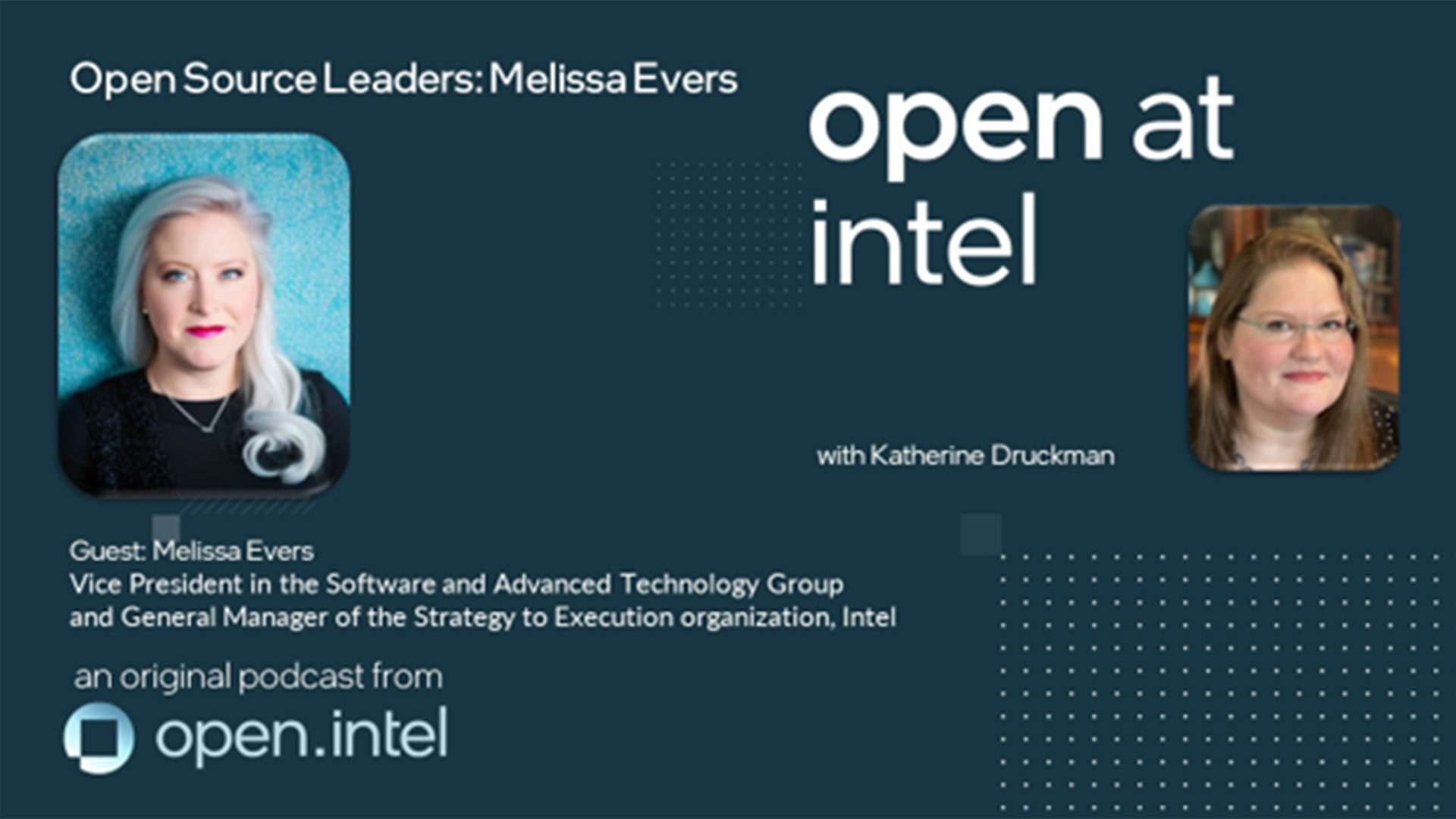In this interview, Katherine Druckman sits down with Melissa Evers, Vice President in the Software and Advanced Technology Group and General Manager of the Strategy to Execution (S2E) organization at Intel Corporation, to discuss her role at Intel, her involvement in external open source communities like the Linux Foundation*, and her passion for open source development. Melissa shares her open source origin story, the importance of open development, and the impact it has on technology advancement and innovation. She also offers advice for those looking to contribute to open source projects and organizations.
Katherine Druckman: Tell us a little bit about your team at Intel and your role both at Intel and your participation in external open source communities like, for example, the Linux Foundation.
Melissa Evers: I have the privilege of leading an organization called the Strategy to Execution team within the Software and Advanced Technology Group at Intel. Our team is responsible for being agents of change and transformation, as well as executing software strategies for both the Software and Advanced Technology Group and the broader software development teams across Intel. This includes working with the open ecosystem team, program management, and driving software quality and security practices. My role also involves engaging with external open source communities, such as the Linux Foundation, to contribute to open development and foster collaboration.
Katherine Druckman: I agree. I honestly feel quite privileged to be in my position, in my little part of S2E. I'm a little biased, but I think we have a great group. So tell me, what is your open source origin story? What brought you into the open source community?
Melissa Evers: It's funny because my journey into open source development was very specific. I had three careers in my life: civil structural engineering, finance and strategy, and open source software development. It was during my second career, while managing the financials for part of Intel, that I fell in love with open source development. We were struggling to create low-cost laptop-like devices for the education segment, and the existing operating system was not meeting our price point requirements. So we created a project called MeeGo*, a Linux* operating system, to meet the needs of the netbook market. We were able to leverage the work done by the open source community and quickly create an operating system that was super cute and met the market's needs. This experience made me a staunch advocate for open source development.
Katherine Druckman: That's great. I love that MeeGo is your story. I remember it fondly. Covering MeeGo was part of my work in the past, and it was awesome and created a whole community around it. So, Melissa, tell me, why is it important for you to give your time or resources to open source communities like the Linux Foundation external to Intel?
Melissa Evers: Creating the infrastructure to enable open source communities to thrive is essential. It may not be the most glamorous work, but it is crucial for the success of open development. Foundations like the Linux Foundation play a vital role in providing the infrastructure, events, training, and security measures necessary for communities to flourish. Open development would not be possible without the dedication of individuals who contribute their time and energy to community work. It is important for anyone who believes in open development to support and create healthy, vibrant communities that operate with transparency, accountability, and trust. These communities are the foundation of our future technological advancements.
Katherine Druckman: You wear a lot of hats. You lead the S2E organization within Intel, and you wear hats that are external to Intel, like the Linux Foundation. How do you balance all those, and how do those missions align?
Melissa Evers: Intel's core purpose aligns with the vision of the Linux Foundation and other open source development foundations. We believe that technology is advanced through neutral horizontal open competition. Intel powers compute, hardware, and services, and we recognize that open source and open development are crucial for driving innovation, standardization, and commoditization of technology. Both Intel and the Linux Foundation strive to create a level playing field for the next generation of innovation to occur. Balancing these roles is about ensuring that our actions align with our core purpose and contribute to the advancement of technology for the benefit of all.

Katherine Druckman: There's a phrase open source people like to use, and that is "chop wood and carry water." What does that phrase mean to you in terms of contributing to open source projects and communities?
Melissa Evers: "Chop wood and carry water" means doing the work of the community to enable the project to thrive. It goes beyond just feature development. It includes reviewing pull requests, resolving bugs, working on documentation, and other essential tasks that may not be glamorous but are necessary for delivering production-ready software. Each individual in the community has a responsibility to contribute their skills and help the project succeed. Recognizing the value of this work and acknowledging those who contribute is crucial for the continued advancement of open source projects.
Katherine Druckman: I think that's wonderful advice. I think this type of involvement can be intimidating for people who are interested in contributing, even people with engineering skills or other skills. But I would also add that people in most communities are very kind and excellent at nurturing new contributors. You'll learn tremendous things as a young engineer or newcomer by diving in and doing that kind of work out in the open.
Melissa Evers: I agree. It's important to remember that everyone had to start somewhere. Taking that first step can be intimidating, but communities are generally supportive and understanding. It's about finding your unique skills and where you can contribute, whether it's through engineering, marketing, documentation, or other areas. Open source communities provide abundant opportunities for growth and learning.
Katherine Druckman: What excites you most about the future of open source as a whole, both in our group at Intel or with external communities? What do you see on the horizon? How are we changing the world?
Melissa Evers: Open source has the power to tackle the world's biggest challenges. Whether it's genomics, healthcare, climate change, or AI, open source communities can come together to solve these problems. We're still in a phase where technology is proprietary and vertically stacked, but open source has the potential to drive mainstream adoption, standardization, and commoditization. By harnessing the power of open development, we can create transparency, accountability, and responsibility in technology advancements. Open source is uniquely capable of addressing global challenges and driving innovation for the benefit of humanity.
Katherine Druckman: I wholeheartedly agree. I think transparency is going to be key to solving the big problems. So where would you personally like to have the most impact, and what do you want to be known for?
Melissa Evers: Personally, I like to be known for being someone who solves problems and brings people together. I enjoy facilitating collaboration and uniting individuals with different perspectives and backgrounds to work toward a common purpose. I believe in integrity, trust-building, and recognizing the importance of relationships. I want to have a positive impact by fostering collaboration and addressing challenges in the technology landscape.
Katherine Druckman: I love your hopeful and optimistic take, and I appreciate you taking that kind of role. What is your advice for people who would like to get more involved in contributing to open source projects and organizations?
Melissa Evers: One common misconception is that you have to be an engineer to contribute to open source projects, but that's not true. There are opportunities for everyone, whether it's in marketing, documentation, event planning, or other areas. If you have a passion for a particular open source project, get involved by attending meetings, joining mailing lists, and familiarizing yourself with the community. Raise your hand, volunteer, and see where your unique skills can benefit the project. For engineers, there are countless opportunities to contribute code, close bugs, and make a difference. Taking that first step can be intimidating, but remember that everyone started somewhere. Open source communities are welcoming and supportive, and there's always room for new contributors.
Katherine Druckman: I think that's wonderful advice. I appreciate all of this wisdom and insight that you've shared with us. Is there anything else you would like to add or share?
Melissa Evers: I would like to express my sincere thanks to the open source community for their hard work and dedication. It is because of individuals like you that our technology landscape continues to evolve and improve. Your contributions are invaluable, and I encourage you to continue persevering and being resilient. If you see Intel or Intel engineers behaving in ways that are incongruous with our mission and values, please reach out to me. Your feedback is important, and we are committed to aligning our actions with the open source community's goals. Thank you again for everything you do.
To hear more of this conversation and others, subscribe to the Open at Intel podcast:
- openatintel.podbean.com
- Google Podcasts
- Apple Podcasts
- Spotify
- Amazon Music
- Your favorite podcast player (RSS)
About the Author
Katherine Druckman, Open Source Evangelist, Intel
Katherine Druckman, an Intel open source evangelist, hosts the podcasts Open at Intel, Reality 2.0, and FLOSS Weekly. A security and privacy advocate, software engineer, and former digital director of Linux Journal, she’s a longtime champion of open source and open standards.
